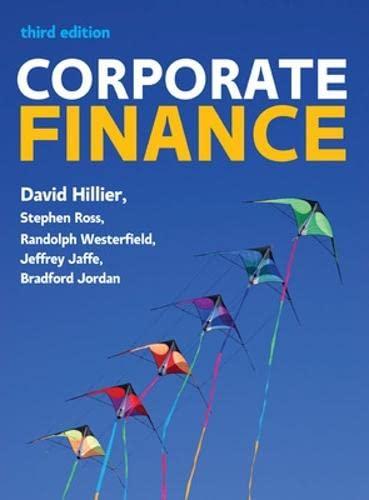As a new university graduate, you have taken a management position with Exotic Cuisines plc, a restaurant
Question:
As a new university graduate, you have taken a management position with Exotic Cuisines plc, a restaurant chain that just went public last year. The company’s restaurants specialize in exotic main dishes, using ingredients such as wild boar, crocodile and pheasant. A concern you had going in was that the restaurant business is very risky. However, after some due diligence, you discovered a common misperception about the restaurant industry. It is widely thought that 90 per cent of new restaurants close within 3 years; however, recent evidence suggests the failure rate is closer to 60 per cent over 3 years. So it is a risky business, although not as risky as you originally thought.
During your interview process, one of the benefits mentioned was employee share options.
Upon signing your employment contract, you received options with a strike price of £50 for 10,000 shares of company equity. As is fairly common, your share options have a 3-year vesting period and a 10-year expiration, meaning that you cannot exercise the options for 3 years, and you lose them if you leave before they vest. After the 3-year vesting period, you can exercise the options at any time. Thus, the employee share options are European (and subject to forfeit) for the first 3 years and American afterward. Of course, you cannot sell the options, nor can you enter into any sort of hedging agreement. If you leave the company after the options vest, you must exercise within 90 days or forfeit.
Exotic Cuisines equity is currently trading at £24.38 per share, a slight increase from the initial offering price last year. There are no market-traded options on the company’s equity.
Because the company has been traded for only about a year, you are reluctant to use the historical returns to estimate the standard deviation of the equity’s return. However, you have estimated that the average annual standard deviation for restaurant company shares is about 55 per cent. Because Exotic Cuisines is a newer restaurant chain, you decide to use a 60 per cent standard deviation in your calculations. The company is relatively young, and you expect that all earnings will be reinvested back into the company for the near future. Therefore, you expect no dividends will be paid for at least the next 10 years. A 3-year Treasury note currently has a yield of 3.8 per cent, and a 10-year Treasury note has a yield of 4.4 per cent.
1 You are trying to value your options. What minimum value would you assign? What is the maximum value you would assign?
2 Suppose that in 3 years the company’s equity is trading at £60. At that time should you keep the options or exercise them immediately? What are some of the important determinants in making such a decision?
3 Your options, like most employee share options, are not transferable or tradable. Does this have a significant effect on the value of the options? Why?
4 Why do you suppose employee share options usually have a vesting provision? Why must they be exercised shortly after you depart the company even after they vest?
5 As we have seen, much of the volatility in a company’s share price is due to systematic or marketwide risks. Such risks are beyond the control of a company and its employees.
What are the implications for employee share options? In light of your answer, can you recommend an improvement over traditional employee share options?
Step by Step Answer:

Corporate Finance
ISBN: 9780077173630
3rd Edition
Authors: David Hillier, Stephen A. Ross, Randolph W. Westerfield, Bradford D. Jordan, Jeffrey F. Jaffe





